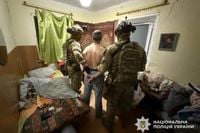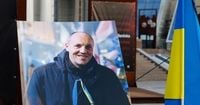On a somber September morning in Lviv, Ukraine, crowds gathered outside the Archcathedral of St. George to bid farewell to Andriy Parubiy, a pivotal figure in Ukraine’s recent political history. The outpouring of grief was palpable, as relatives, colleagues, and ordinary Lviv residents assembled more than an hour before the official funeral service began. Their presence underscored the deep shock and sorrow that has swept through Ukraine since Parubiy’s assassination on August 30, 2025—a killing that authorities say bears the hallmarks of a carefully orchestrated contract hit with Russian involvement.
Parubiy, 54, was no stranger to the turbulence of Ukrainian politics. As the former Speaker of the Verkhovna Rada (Ukraine’s parliament) and a leading member of the pro-European European Solidarity party, he stood at the heart of the country’s democratic transformation. His activism during the 2013-2014 Euromaidan protests, which led to the ouster of pro-Russian president Viktor Yanukovych, made him a symbol of Ukraine’s westward aspirations and a frequent target of Russian propaganda campaigns.
The events surrounding Parubiy’s death unfolded with chilling precision. According to the Prosecutor General’s Office of Ukraine, an unknown assailant approached Parubiy in broad daylight on August 30 in Lviv, firing eight shots with a short-barreled firearm. Seven shell casings were recovered at the scene. Unverified footage circulating in Ukrainian media appears to show the attacker, disguised as a courier and wearing a helmet, walking up behind Parubiy before opening fire. The gunman fled on an electric bicycle, vanishing into the city’s maze of streets and triggering a nationwide manhunt.
Authorities wasted no time. Within hours, a special operation known as “Siren” was launched in Lviv. By the night of September 1, a suspect—a 52-year-old resident of Lviv—was apprehended in the Khmelnytskyi region, some 250 kilometers away. The arrest was the result of a coordinated effort involving dozens of officers from the Lviv and national police, as well as the Security Service of Ukraine (SBU). Photos released by the National Police show the suspect, shirtless and handcuffed, flanked by special forces officers.
President Volodymyr Zelenskyy personally supervised the investigation and confirmed the arrest through a statement on X (formerly Twitter): “The suspect has given an initial testimony. Urgent investigative actions are currently underway to establish all the circumstances of this murder. The entire law enforcement team and the prosecutors are working around the clock.” Chief prosecutor Ruslan Kravchenko and Interior Minister Ihor Klymenko echoed Zelenskyy’s determination, emphasizing the efficiency and urgency of the multi-agency probe.
What makes this crime particularly alarming, officials say, is the evidence pointing to a “Russian trace.” Ivan Vyhivskyi, head of the National Police of Ukraine, was unequivocal: “We know this crime is not accidental. There is a Russian trace in it.” The SBU’s regional chief, Vadym Onyshchenko, elaborated, noting “operational information indicating the possible involvement of the Russian Federation’s special services in organizing the murder.” According to Vyhivskyi, the suspect spent a long time “preparing, watching, planning, and finally pulling the trigger.” He described the attack as an act of “cold-blooded cruelty,” adding, “He even made sure that the victim was dead. Then he tried to cover his tracks—he changed his clothes, got rid of the weapon, and tried to hide in the Khmelnytskyi region.”
The timing of the assassination added to the sense of unease. The shooting occurred just hours after Russia launched another barrage of missiles and drones at Ukrainian targets, a grim reminder of the ongoing war’s reach and the persistent dangers faced by public figures. Lviv’s mayor, Andriy Sadovyi, summed up the prevailing mood: “This is a matter of security in a country at war, where, as we can see, there are no completely safe places.”
Parubiy’s career was defined by moments of national crisis and transformation. Elected to parliament in 2007, he rose to prominence during the EuroMaidan protests, leading volunteer self-defense groups and advocating for closer ties with the European Union. In the aftermath of Yanukovych’s flight to Russia, Parubiy served as secretary of the National Security and Defence Council during Russia’s annexation of Crimea and the outbreak of war in eastern Ukraine. He became first deputy parliament speaker in 2014, then Speaker from 2016 to 2019. Since 2019, he had represented the European Solidarity party, led by former President Petro Poroshenko.
His legislative legacy includes championing the 2019 law “On ensuring the functioning of the Ukrainian language as the state language,” a move that made him a particular target of Russian disinformation and state media. Parubiy’s advocacy for Ukrainian sovereignty and identity, especially amid the ongoing conflict with Russia, cemented his status as a key pro-Western voice in Ukraine’s parliament.
As details of the investigation continue to emerge, authorities are probing whether Parubiy had received threats prior to his death. The SBU has characterized the killing as a contract hit, with “signs of being a contract killing” and “possible involvement of the Russian Federation’s special services,” according to Onyshchenko. Russia has not commented on the killing or the allegations of involvement, but Kyiv officials have been forthright in pointing to a geopolitical motive behind the attack.
The funeral for Parubiy unfolded with the dignity and gravity befitting his stature. The service began at noon on September 2 at the Archcathedral of St. George, followed by a citywide farewell at Lviv’s historic Rynok Square. Parubiy’s final resting place is the revered Lychakiv Cemetery, among other luminaries of Ukrainian history. The city’s collective mourning was a testament to his influence and the high stakes of Ukraine’s ongoing struggle for sovereignty and security.
As the investigation presses on, the country remains on edge, grappling with the loss of a prominent leader and the specter of foreign interference. For many Ukrainians, the assassination of Andriy Parubiy is not just a personal tragedy but a stark reminder of the dangers that persist in a nation at war—and the resilience required to face them.


